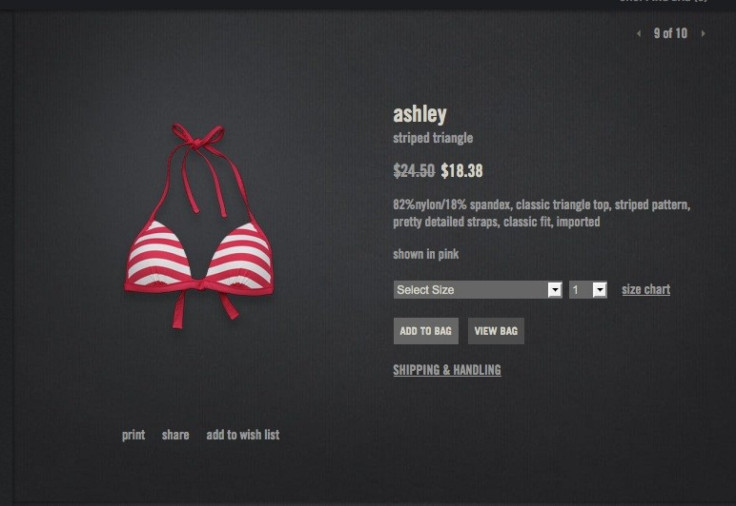'Ashley' Push-Up Triangle: Not the First Case of Over-Sexualization of Children

Abercrombie and Fitch's Ashley Push-Up Triangle bikini has been dubbed the worst product flop of 2011 by Yahoo Finance's 24/7 Wall Street.
In March 2011, Abercrombie & Fitch unveiled its spring children's collection for Abercrombie Kids. This particular store targets children ages 8 to 14. Included in the line was the Ashley Push-Up Triangle, a bikini top with triangle-shaped fabric lined with push-up padding.
The product immediately elicited angry responses from parents across the nation. The push-up bra is, effectively, a sex tool, designed to push the breasts up and out, putting them front and center, where they're more accessible to the eye (and everything else), parenting blog Babble wrote.
Unfortunately, this was not the first case of over-sexualization of children in 2011. It is not even the only instance involving Abercrombie. Here are some of the other disturbing controversies involving the exploitation of children sparked this year.
Abercrombie Kids Cute Butt Sweatpants
In May 2011, shoppers raised their eyebrows over Abercrombie Kids' cute butt sweatpants, loungewear marketed to youngsters with the description fitted with a little stretch for a sexy look to give you the perfect butt. MSNBC noted that these pants could be worn by girls as young as 7-years-old.
Mothers were offended by this ploy to market such sexualized goods to children. It's important to realize that these clothes are ubiquitous and they are hard to avoid. Eleanor Mackey, Ph.D, clinical psychologist at Children's National Medical Center, told MSNC. But when young girls wear these clothes they send the message that they are sexually available. And the more they are exposed to clothes that suggest they should be attractive to the opposite sex, they could put themselves into risky situations.
Lingerie for Little Girls by Jours Apres
The French lingerie company Jours Après Lunes, which formerly targeted adult woman, launched a line of lingerie for girls' ages four to 12 in August 2011. The collection came complete with panties and bras adorned with lace and bows. The girls modeling the clothing wore pearl necklaces, sunglasses and make-up. The ads featured photographs of the young adolescents dressed in the provocative undergarments, jumping on beds and laughing.
Designer Sophie Morin defended the line, calling it innovative and unexpected, according to an article featured on ABC News. Many disagreed with Morin's appeal. This kind of marketing does sexualize young girls, it does serve as a model that inspires very young girls to think that minimizing what they wear and revealing as much of their body as possible is appropriate, and 'fashionable' and 'cool,' and that this is the way that they should think of themselves, Paul Miller, associate professor of psychology at Arizona State University in Phoenix, wrote in an email to ABCNews.com.
Banned Padded Bras in UK
In June, high street shops in the UK were banned from selling padded bras and sexually suggestive clothing marketed to minors. The rule coincided with the government-commissioned review of the sexualization of children by Reg Bailey, head of the Mothers' Union, reported The Daily Mail. Controversial products on the list included High School Musical-themed underwear with the slogan Dive In, Playboy stationery, and crop-tops for young girls reading Future Porn Star. A padded bra and panties reading Little Miss Naughty by clothing company Little Miss were also outlawed.
Bailey's review demanded that retailers signs a voluntary code of practice with rules on how to market products to children. The guidelines read: Slogans and imagery including licensed images and brand marks must be age-appropriate and without undesirable associations or connotations - for example, sexually suggestive, demeaning, derogative or political material.
Thylane Lena-Rose Blondeau
Images of 10-year-old model Thylane Lena-Rose Blondeau surfaced from the January issue of French Vogue, showing a highly-sexualized editorial of the young Blondeau-turned-Lolita draped over various animal skins, lathered in make-up, and staring seductively into the camera.
The photos caused a firestorm sparked by individuals furious that such images - which some claimed blurred the line between fashion editorial and child pornography - would be condoned. Despite shocking and appalling many, Blondeau's mother defends the racy spread. Quoted in an ABC News article, Veronika Loubry, a fashion designer herself, told a French newspaper, The only thing that shocks me about the photo is the necklace that she's wearing, which is worth 3 million Euros [$4.3 million]. Comments were later posted on Blondeau's Facebook fan page, possibly by the mother, stating bad person [sic] in usa [sic] for drawing attention to her daughter, before later posting that something going's [sic] wrong at the moment. The page was then shut down.
According to the Daily Mail, Fleur Dorrell of the Mothers' Union in the UK described the images as physically disturbing and guilty of blurring all thoughts of beauty. She also expressed grave concerns over both Vogue and the modeling agency that represents Miss Blondeau.
She is over sexualized, just look what happened to JonBenet Ramsey, clinical psychologist Leslie Seppinni said in an E! News article. When you dress a young girl up provocatively with makeup to give her the appearance of an adult, then these pedophiles who have a propensity for child abuse are receiving the message that's OK, when it's not.
© Copyright IBTimes 2024. All rights reserved.





















